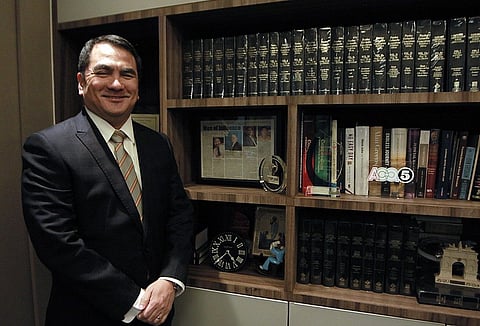
- NEWS
- the EDIT
- COMMENTARY
- BUSINESS
- LIFE
- SHOW
- ACTION
- GLOBAL GOALS
- SNAPS
- DYARYO TIRADA
- MORE

As artificial intelligence (AI) continues to integrate into everyday life and industry, its potential benefits and inherent risks are increasingly evident.
Atty. Nilo Divina, Dean of the University of Santo Tomas (UST) College of Law, recently addressed these issues, emphasizing the need for a balanced approach that also nurtures spiritual intelligence.
“Nurturing spiritual intelligence alongside technological advancement becomes essential for promoting holistic well-being, ethical conduct, and meaningful relationships,” he asserted.
This perspective, he believes, is vital for maintaining a connection with the divine and fostering true peace and joy. “Love, peace, and joy can only come from God, and not from a computer algorithm,” Divina said.
Divina outlined how AI has seamlessly woven itself into the fabric of daily activities and business operations.
“AI’s ability to mimic human problem-solving and decision-making capabilities, especially when combined with sensors, geolocation, and robotics, enables it to perform tasks across various domains efficiently and accurately,” he explained.
This transformation, he said, can be seen in the widespread use of virtual assistants like Siri and Alexa and the rise of predictive analytics in various sectors.
AI’s capacity to automate repetitive tasks and tailor content to specific groups is revolutionizing how we live and work.
However, Divina warned that this technology’s rapid advancement comes with significant risks if not managed responsibly.
“AI could make social inequalities and unfairness if the data used to teach AI programs is biased,” he explained.
Furthermore, AI’s potential to replace jobs traditionally held by humans could exacerbate financial instability in vulnerable communities, he added.
Divina also raised concerns about the ethical implications of AI, particularly regarding privacy, data security, and the potential devaluation of human interaction and empathy.
He emphasized the importance of using AI responsibly to avoid these pitfalls. “AI can negatively affect people and the environment if one does not use them safely and responsibly,” he cautioned.
Beyond the tangible risks and benefits, Divina called attention to the often-overlooked aspect of spiritual intelligence, which he believes is crucial for navigating the complexities introduced by AI.
Drawing on the work of Fraser Watts, he described spiritual intelligence as encompassing self-awareness, empathy, compassion, and a sense of purpose. “Spiritual intelligence involves self-awareness, empathy, compassion, and a sense of purpose,” Divina noted.
Divina argued that while AI is driven by algorithms, spiritual intelligence draws on deeper human faculties.
“Spiritual intelligence is akin to moral, aesthetic, social, and emotional sensibilities,” he stated. It provides individuals with the capacity to enrich their experiences with moral depth and social consciousness, complementing the efficiency of AI with wisdom and compassion, he explained.
